
Pharmaceutical Medicine
Scope & Guideline
Exploring the science behind safe and effective medications.
Introduction
Aims and Scopes
- Pharmaceutical Research and Development:
Exploration of methodologies and innovations in drug discovery, development, and approval processes, with a focus on enhancing efficiency and effectiveness. - Regulatory Affairs and Compliance:
Analysis of regulatory frameworks, compliance challenges, and evolving guidelines affecting drug approval and market access across various regions. - Medical Affairs and Education:
Investigation into the role of medical affairs in the pharmaceutical industry, including education strategies for healthcare providers and engagement with patients. - Pharmacovigilance and Drug Safety:
Emphasis on monitoring drug safety post-marketing, signal detection, and implementation of risk minimization measures to ensure patient safety. - Patient-Centric Approaches:
Incorporation of patient perspectives in drug development and clinical trials, focusing on adherence, preferences, and outcomes. - Emerging Technologies in Pharmaceuticals:
Assessment of the impact of digital technologies, artificial intelligence, and real-world evidence on pharmaceutical practices and healthcare delivery.
Trending and Emerging
- Artificial Intelligence and Machine Learning Applications:
The increasing integration of AI and machine learning in drug development and pharmacovigilance indicates a significant trend towards leveraging technology to enhance efficiency and data analysis. - Patient-Centric Drug Development:
A growing emphasis on patient engagement and the incorporation of patient preferences in clinical trial design and drug development processes showcases a shift towards more patient-centered approaches. - Real-World Evidence Utilization:
The use of real-world data to inform decision-making in drug approval and post-marketing assessments is emerging as a critical area of focus, reflecting the industry's need for better understanding of drug effectiveness in diverse populations. - Diversity, Equity, and Inclusion in Clinical Trials:
Increasing attention to diversity and inclusion within clinical trial populations highlights the industry's commitment to addressing health disparities and ensuring equitable access to treatments. - Decentralized Clinical Trials:
The rise of decentralized clinical trials, facilitated by technology and remote monitoring, represents a significant shift in how clinical studies are conducted, aiming to improve patient participation and data collection.
Declining or Waning
- Traditional Clinical Trial Models:
There is a noticeable decrease in publications focusing on conventional clinical trial methodologies, possibly due to the rise of decentralized trials and adaptive designs. - Single-Use Drug Formulations:
Research on single-use formulations seems to be declining as the industry shifts towards more comprehensive therapeutic strategies and complex drug delivery systems. - Pharmaceutical Marketing Strategies:
Discussions around traditional pharmaceutical marketing tactics are less frequent, indicating a shift towards more integrated and value-based approaches to market access. - Regulatory Challenges in Established Markets:
The focus on regulatory challenges specific to established markets (e.g., EU, USA) is diminishing, possibly as the industry adapts to newer regulatory frameworks and harmonization efforts. - Post-Marketing Studies:
There appears to be a reduction in studies solely dedicated to post-marketing surveillance of drugs, as new methodologies for real-world evidence gain traction.
Similar Journals

DARU-Journal of Pharmaceutical Sciences
Pioneering insights in the evolving landscape of pharmaceuticals.DARU-Journal of Pharmaceutical Sciences is a leading peer-reviewed journal published by SPRINGER INT PUBL AG that focuses on the dynamic and rapidly evolving fields of pharmaceutical sciences, including drug discovery, pharmacology, and toxicology. With an impressive Q2 ranking in both Drug Discovery and Miscellaneous Medicine categories for 2023, this journal stands out as a vital resource for researchers, professionals, and students alike, offering a platform for significant contributions to the scientific community. Covering a comprehensive scope from 2000 to 2024 and indexed by Scopus, the journal ranks within the top percentile in its field, with a ranking of #66/313 in Pharmacology and #34/157 in Drug Discovery, reaffirming its impact and relevance. The journal promotes open access to foster widespread dissemination of knowledge in pharmaceutical sciences, ultimately aiming to bridge the gap between research and clinical applications. For those looking to stay at the forefront of pharmaceutical innovation, DARU represents an invaluable connection to the latest studies and breakthrough findings.

ACTA PHARMACEUTICA
Your gateway to groundbreaking research in medicine and pharmaceuticals.ACTA PHARMACEUTICA is a distinguished open-access journal published by SCIENDO, dedicated to advancing knowledge in the fields of medicine and pharmaceutical sciences. Established in 1992, the journal has made significant contributions to the scholarly community, providing a platform for innovative research and discussion. With a strong presence in both Q2 and Q3 quartiles across various categories including Pharmaceutical Science and Pharmacology, ACTA PHARMACEUTICA ranks favorably, positioning its contributions in the upper tiers of the field. The journal's commitment to open access since 2007 ensures that both practitioners and scholars have immediate access to cutting-edge developments, thereby fostering collaboration and knowledge sharing. With its scope spanning a broad spectrum of pharmaceutical and biomedical research, ACTA PHARMACEUTICA is an essential resource for researchers, professionals, and students keen to stay abreast of the latest advancements and trends in these vital areas of study.
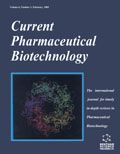
CURRENT PHARMACEUTICAL BIOTECHNOLOGY
Elevating Knowledge in Pharmaceutical BiotechnologyCURRENT PHARMACEUTICAL BIOTECHNOLOGY is a prestigious academic journal dedicated to advancing the field of pharmaceutical biotechnology by publishing high-quality research articles, reviews, and innovatory methodologies. Published by Bentham Science Publishers Ltd, this journal has established a strong reputation in its field, reflected in its 2023 Scopus rankings: it holds an impressive Q2 classification in Pharmaceutical Science and Q3 in Biotechnology, indicating its significant impact within these disciplines. With an ISSN of 1389-2010 and an E-ISSN of 1873-4316, CURRENT PHARMACEUTICAL BIOTECHNOLOGY provides a reliable platform for disseminating valuable research findings and fostering collaboration among researchers, professionals, and students alike. The journal covers a wide array of topics, from drug development and delivery systems to innovative biotechnological techniques, thus serving as an essential resource for anyone interested in the cross-section of pharmaceutical science and biotechnology. Researchers can access a diverse range of articles that explore both theoretical frameworks and practical applications, reflecting the ongoing evolution and challenges in this dynamic field.
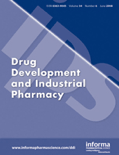
DRUG DEVELOPMENT AND INDUSTRIAL PHARMACY
Advancing Pharmaceutical Innovation and ExcellenceDrug Development and Industrial Pharmacy is a prestigious journal published by Taylor & Francis Ltd, focusing on the critical field of pharmaceutical sciences. With an ISSN of 0363-9045 and an E-ISSN of 1520-5762, the journal has been an essential resource for researchers and professionals since its inception in 1974. It occupies a crucial niche within Drug Discovery, Organic Chemistry, and Pharmaceutical Science, currently ranked in the second and third quartiles, reflecting its solid contribution to the field. The journal encompasses a wide array of topics, including drug development processes, formulation, and industrial manufacturing alongside cutting-edge research in pharmacology and toxicology. With a commendable Scopus ranking demonstrating high relevance—ranked #44 in Pharmaceutical Science—it serves as a vital forum for academia and industry to share innovative findings and methodologies. While it does not offer open access, the journal remains an invaluable resource for those seeking to advance their knowledge and enhance their research in pharmaceutical development.
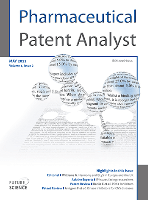
Pharmaceutical Patent Analyst
Unveiling Strategies for Pharmaceutical Innovation and CompliancePharmaceutical Patent Analyst, published by Taylor & Francis Ltd, is a premier journal dedicated to the evolving fields of pharmaceutical science and patent law. Established in 2012, this journal provides a rigorous platform for scholarly articles, analytical studies, and insightful reviews that delve into the intersection of drug discovery, pharmaceutical innovation, and intellectual property rights. With a Q2 category ranking in Pharmaceutical Science and Q3 rankings in both Drug Discovery and Medicine (miscellaneous), it is recognized for its impactful contributions to the academic community and industry professionals alike. The journal aims to enhance the understanding of patent strategies, explore emerging pharmaceutical technologies, and foster dialogue on regulatory challenges, ultimately facilitating innovation in drug development. Although it does not currently offer open access, its comprehensive and high-quality content remains essential for researchers, professionals, and students pursuing excellence in pharmaceutical research and patent analysis.
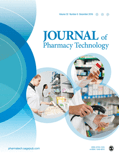
JOURNAL OF PHARMACY TECHNOLOGY
Driving excellence in pharmacy technology research and application.JOURNAL OF PHARMACY TECHNOLOGY is a premier publication in the field of Pharmaceutical Science, established in 1989 and published by SAGE PUBLICATIONS INC. This journal serves as an essential resource for professionals, researchers, and students dedicated to the advancements in pharmacy technology and the application of innovative solutions in pharmaceutical practices. With an ISSN of 8755-1225 and an E-ISSN of 1549-4810, the journal provides a rigorous peer-reviewed platform for disseminating cutting-edge research and case studies. As of 2023, it is ranked Q3 in the Scopus categories of Pharmacology, Toxicology, and Pharmaceutics, highlighting its relevance in the field. Although it currently does not offer an Open Access option, JOURNAL OF PHARMACY TECHNOLOGY aims to remain a critical avenue for scholarly communication and knowledge dissemination among practitioners in the pharmaceutical sector, ensuring they stay informed of the latest trends and findings that impact their work.
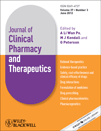
JOURNAL OF CLINICAL PHARMACY AND THERAPEUTICS
Connecting science and practice for enhanced therapeutic strategies.JOURNAL OF CLINICAL PHARMACY AND THERAPEUTICS, an esteemed publication in the field of pharmacology, is published by Wiley-Hindawi and has been at the forefront of clinical research since its inception in 1976. Operating primarily from the United Kingdom, this journal features a diverse array of articles that encompass both fundamental and practical aspects of clinical pharmacy, thereby supporting the advancement of therapeutic practices. With an ISSN of 0269-4727 and an E-ISSN of 1365-2710, it is indexed in key databases and holds respectable ranks within its categories; achieving Q3 in Pharmacology and Q2 in Medical Pharmacology in the latest quartile rankings. Its Scopus ranking reflects both its quality and relevance, being positioned in the 55th percentile for medical pharmacology and the 45th for pharmacology, toxicology, and pharmaceutics. Although it does not currently operate under an Open Access model, the journal's extensive readership and rigorous peer-review process ensure that the latest research reaches practitioners and academics alike. With a commitment to bridging the gap between pharmacological science and clinical practice, the JOURNAL OF CLINICAL PHARMACY AND THERAPEUTICS remains a critical resource for professionals striving to enhance patient outcomes through informed medication management.
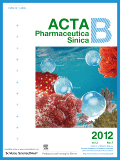
Acta Pharmaceutica Sinica B
Bridging Knowledge and Innovation in PharmaceuticsActa Pharmaceutica Sinica B is a prestigious open access journal that has been setting the standard in the field of pharmacology, toxicology, and pharmaceutics since its establishment in 2011. Published by the Institute of Materia Medica, Chinese Academy of Medical Sciences, the journal serves as a vital platform for researchers, professionals, and students seeking to disseminate innovative findings in drug development, pharmaceutical sciences, and therapeutic applications. With an impressive impact factor reflecting its high academic quality, Acta Pharmaceutica Sinica B has achieved Q1 status in the category of Pharmacology, Toxicology and Pharmaceutics as of 2023, ranking #1 out of 80 journals in General Pharmacology. This journal not only focuses on the latest advancements in drug research and formulation but also emphasizes interdisciplinary approaches, fostering collaborations that span various scientific domains. The accessible nature of the journal, combined with its rigorous peer-review process, ensures that crucial insights and breakthroughs reach a global audience swiftly and effectively. For those looking to stay at the forefront of pharmaceutical research, Acta Pharmaceutica Sinica B is an indispensable resource.

Pharmaceutical Sciences
Empowering global health through cutting-edge pharmaceutical research.Pharmaceutical Sciences, an esteemed journal published by Tabriz University of Medical Sciences, Faculty of Pharmacy, serves as a crucial platform for the dissemination of pioneering research in the fields of pharmaceutical science, pharmacology, and toxicology. With an impact factor reflective of its substantial contribution to the scientific community, this open access journal has been accessible since 2012, ensuring that researchers, professionals, and students worldwide can engage with its rich content. Located in Iran, it has continually evolved, covering research from 2009 to 2024, and boasts impressive rankings in multiple Scopus categories, including Q3 in Pharmaceutical Science and Q2 in Pharmacology, Toxicology and Pharmaceutics. By bridging gaps between scientific inquiry and practical applications, Pharmaceutical Sciences is dedicated to advancing pharmaceutical knowledge and promoting innovative practices that address significant health challenges.

PHARMACIA
Fostering collaboration in the quest for pharmaceutical excellence.PHARMACIA is a distinguished open-access journal, published by PENSOFT PUBLISHERS, that has been a pivotal platform for advancing the field of pharmaceutical sciences since 2007. This journal, with ISSN 0428-0296 and E-ISSN 2603-557X, is based in Bulgaria and continues to publish high-quality research and reviews relevant to pharmacy, pharmacology, and toxicology. Recognized in the Q3 category for Pharmaceutical Sciences and Pharmacology (medical), as well as Q2 in Pharmacy according to the latest rankings, PHARMACIA is celebrated for its commitment to fostering knowledge dissemination and innovation in drug development, therapeutic approaches, and pharmacological research. With a Scopus rank of #17 in Pharmacy and recognition in various health professions, the journal attracts contributions from researchers, professionals, and students seeking to impact the pharmaceutical landscape. Its convenient open-access format ensures that articles are readily available to a global audience, encouraging collaboration and advancement in the life sciences.